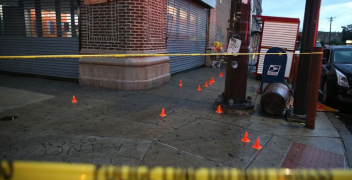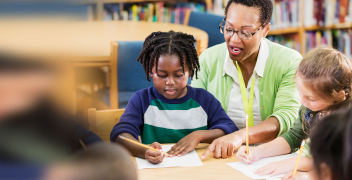Tips for Parents on Talking to Children Exposed to Violent Events
There are common reactions for children who have witnessed violent events: They may have difficulty paying attention or concentrating, be more irritable or defiant, have trouble separating from caregiver, and their sleep and appetite habits may change. Over time these reactions should lessen, but many will need special support to speed and ensure recovery. If your child’s reactions persist after a month or get in the way of a child’s functioning, see your family’s doctor or a mental health professional with expertise in trauma-focused treatments.
Tips from CHOP Experts
- Make Time to Talk To Your Child About the Violent Event
Reassure children and teens that they are safe. Emphasize that schools are generally very safe despite how it may feel. Schools have well-thought out safety procedures and guidelines in place.
Validate their feelings. Explain that all feelings are okay when a tragedy occurs. Let them talk about their feelings, help put them into perspective, and assist them in expressing these feelings appropriately. It might help them to talk about how their friends are expressing themselves about the event, rather than say how they are feeling themselves.
Let their questions be your guide as to how much information to provide. Be patient; children and youth do not always talk about their feelings readily. Watch for clues that they may want to talk, such as hovering around while you do the dishes or yard work.
Children may need concrete activities to express their feelings. Older children may prefer to write, play music, or do an art project as an outlet. Young children may want to draw, look at picture books, or engage in imaginative play.
- Be Observant After Your Child Is Exposed to Violent Event
Observe children’s emotional state. Some children may not express their concerns verbally. Changes in behavior, appetite, and sleep patterns can also indicate a child’s level of anxiety or discomfort. In most children, these symptoms will ease with reassurance and time. However, some children may be at risk for more intense reactions. Children who have had a past traumatic experience or personal loss, suffer from depression or other mental illness, or with special needs may be at greater risk for severe reactions than others. Seek the help of mental health professional if you are at all concerned.
Limit viewing of these events. Limit viewing of the news and related events on any device and be aware if the television is on in when they are around. Developmentally inappropriate information can cause anxiety or confusion, particularly in young children. Adults also need to be mindful of the content of conversations that they have with each other in front of children, even teenagers, and limit their exposure to vengeful, hateful, and angry comments that might be misunderstood.
Maintain a normal routine. Keeping to a regular schedule can be reassuring and promote physical health. Ensure that children get plenty of sleep, regular meals, and exercise. Encourage them to keep up with their schoolwork and extracurricular activities but don’t push them if they seem overwhelmed.
- Provide Developmentally Appropriate Support for Your Child
It’s important to note that emotional responses to violent events can vary greatly depending on the age of a child. Thus, we’ve broken the following tips down by developmental age ranges. A parent knows their child best, but it’s helpful to know how to frame something safely and avoid an unintended consequence.
The National Association of School Psychologists (NASP) recommends you keep your explanations developmentally appropriate:
Early elementary school children need brief, simple information that should be balanced with reassurances that their school and homes are safe and that adults are there to protect them. Give simple examples of school safety like reminding children about exterior doors being locked, child monitoring efforts on the playground, and emergency drills practiced during the school day. Note that children under the age of 6 often do not know that something they are seeing or hearing in the media is not actually happening again.
Upper elementary and early middle school children will be more vocal in asking questions about whether they truly are safe and what is being done at their school to ensure their safety. They may also need assistance separating reality from fantasy.
Upper middle school and high school students will have strong and varying opinions about the causes of violence in schools and society. Let them share concrete suggestions about how to make school safer and how to prevent tragedies in society. Empower your child by reviewing their role in maintaining safe schools by following school safety guidelines (e.g. not providing building access to strangers, reporting strangers on campus, reporting threats to the school safety made by students or community members, etc.), communicating any personal safety concerns to school administrators. Help your child identify at least one adult at school to whom they go if they feel threatened or at risk.
NASP has additional information for parents and educators on school safety, violence prevention, children’s trauma reactions, and crisis response at www.nasponline.org.






